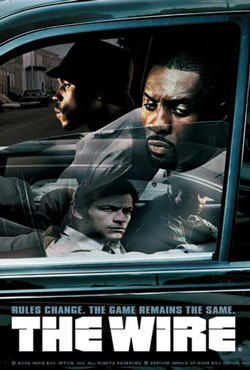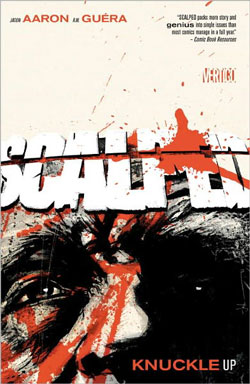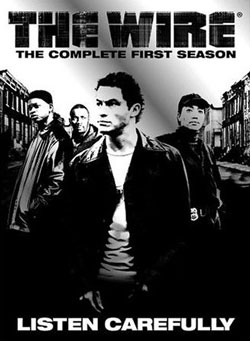
If you were an HBO subscriber from 2002 to 2008 you got to watch something special unfold. That something special was of course David Simon’s acclaimed drama The Wire, which at first glance appeared to be a police procedural about the war on drugs on the streets of Baltimore. Viewers quickly discovered though that The Wire was about so much more. The cops and the criminals were fully fleshed out characters with both positive and negative personality traits, and each season their struggle bumped up against, and influenced, the lives of the citizens and institutions of Baltimore, including the unions, the politicians, the schools, and the newspaper.
So by the end of its run it was clear that The Wire wasn’t just a crime show. It was a television program about the entire community of Baltimore and its struggle to survive. That’s the reason it fascinated so many viewers during its run and that’s why it continues to capture the imagination of viewers discovering it for the first time years later on DVD.
Once someone finishes The Wire the question of course becomes what do they turn to next? What narrative can come close to the power, poignancy, and characterization of The Wire? If you want an answer to those questions I suggest you head down to your local comic book store and pick up the collected editions of writer Jason Aaron and artist R.M. Guera’s Native American crime saga, Scalped, which recently came to a conclusion with issue #70. The series, published by the DC Comics Vertigo imprint, is essentially The Wire set on a fictional Native American reservation in South Dakota. Yes it’s, that good.

In the very first issue of Scalped readers meet the two characters whose conflict is the spine of the series. The first is Chief Lincoln Red Crow, the boss of the casino located on the Prairie Rose reservation and the head of all illicit activity on the “Rez.” The other is Dashiell Bad Horse who grew up on the reservation and has been forced to return to it, much to his chagrin. Dash is back because he is an undercover FBI agent and his superiors have assigned him to infiltrate and destroy Red Crow’s organization.
In the first few issues Dash reacquaints himself with the Rez and meets a host of colorful and eclectic characters like Shunka, Red Crow’s brutal chief enforcer; Carol Ellroy, Red Crow’s daughter who is much more than the femme fatale character she initially appears to be; Dino Poor Bear, a teenage father trying to make ends meet; Granny Poor Bear, an elderly woman who offers spiritual guidance to many of the Rez’s inhabitants; and Dash’s activist mother Gina.
These are just a few of the characters involved in Scalped and all of them are well rounded and important. When he can, Aaron even shifts the spotlight onto these characters and gives them individual stories of their own that detail their hopes, fears, and individual choices. So Scalped is a very character driven story. A character’s actions don’t just have consequences for him or her. More often than not they’ll have consequences for the entire community of Prairie Rose.
As the story in Scalped progresses, Aaron also introduces two murder mysteries; one revolves around a crime committed decades ago and the other involves a more recent homicide. These mysteries play out for a while, but they are solved before the book’s conclusion and the results are both satisfying and horrifying. Plus, when the identity of the person or persons behind the murders is revealed it only causes more trouble for Dash Bad Horse and Lincoln Red Crow.
In terms of tone Scalped is as varied as its diverse cast of characters. Over the course of the ten collected volumes, readers will become embroiled in much of the dangerous and illicit activity on the Rez. Your blood will pump as you watch Dash try to keep his status as an undercover FBI agent secret, and you’ll be shocked and horrified at the explosive violence some of the characters commit when they’re cornered or threatened, or when they deeply desire something.

Those aren’t the only emotions you’ll experience though because Scalped is a crime story, but like The Wire it’s about more than crime. It’s about life in all its humorous, happy, and heartbreaking glory. So seemingly mundane decisions and characters matter: a woman’s struggle to decide whether or not to terminate her pregnancy; a boy’s rejection by the woman he’s in love with; and the day to day routines of an elderly couple who live on a remote section of the Rez.
Over the course of the last few months Aaron began wrapping up the various stories in Scalped, while propelling its primary characters into an explosive, powerful, and satisfying conclusion. By the last page of the final issue every character had grown or changed, and not always in the best possible way. It left the reader feeling like they just read some epic, sprawling, novel that mattered.
The last time I felt that way was when I finished watching the final episode of The Wire. So if you’ve been missing the streets of Baltimore and its various inhabitants I urge you to pick up a copy of Scalped Volume 1: Indian Country. You’ll be taking your first steps into a story every bit as captivating and powerful as one of the greatest TV dramas of all time.
Dave Richards covers all things Marvel Comics for the Eisner Award-winning website Comic Book Resources and his book reviews and other musings can be found at his blog Pop Culture Vulture.

Scalped is an all time great series, and a very important one with its focus on the lives of Native Americans. In concentrating on the writing though, you never even mentioned the brilliant artwork by RM Guera!